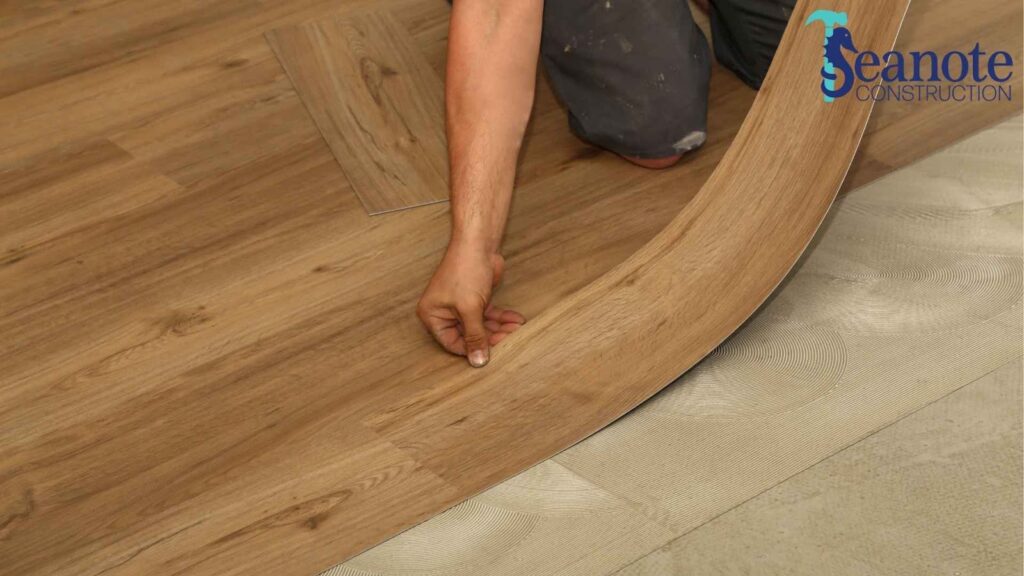Choosing the right flooring for your home is a significant decision that impacts both aesthetics and functionality.
At Seanote Construction, we understand the importance of making informed choices that align with your lifestyle and preferences. Our commitment to quality craftsmanship makes sure that your flooring selection elevates your home’s beauty and meets your practical needs.
Key Takeaways
- Vinyl is budget-friendly, water-resistant, and low-maintenance.
- Hardwood is elegant, boosts home value, but needs more care.
- Vinyl resists damage and hardwood lasts longer with refinishing.
- Choose based on budget, style, and lifestyle needs.
What Is Vinyl Flooring?

Vinyl flooring, especially in its luxury form known as Luxury Vinyl Plank (LVP), is designed to mimic the appearance of natural hardwood, offering a similar aesthetic at a more affordable price point.
Types of Vinyl Flooring
There are several types of vinyl flooring to consider:
- Sheet Vinyl: Comes in large, continuous sheets and is known for being water-resistant and budget-friendly.
- Vinyl Tiles: Individual tiles that can be arranged in various patterns, offering design flexibility.
- Luxury Vinyl Planks (LVP): Planks that closely resemble hardwood, both in appearance and texture. They often feature a click-and-lock system for easy installation.
Pros and Cons of Vinyl Flooring
Pros
- Affordability: Vinyl flooring is generally more cost-effective than hardwood.
- Durability: High-quality vinyl is resistant to scratches, dents, and stains, making it suitable for high-traffic areas.
- Water Resistance: Vinyl’s water-resistant properties make it ideal for moisture-prone areas like kitchens and bathrooms.
- Ease of Maintenance: Vinyl floors are easy to clean and maintain, requiring simple sweeping and occasional mopping.
Cons
- Perception of Value: While modern vinyl has improved in quality, it may not add as much value to your home as hardwood.
- Environmental Concerns: Some vinyl products are not recyclable and may contain chemicals that can affect indoor air quality.
- Feel Underfoot: Vinyl may not have the same warmth and natural feel as hardwood.
Does Vinyl Flooring Look Cheap Compared to Real Wood?
Modern vinyl flooring has advanced significantly, with high-quality options closely mimicking the appearance of real wood. While some may still perceive vinyl as less prestigious than genuine hardwood, many find it an attractive and cost-effective alternative.
Can You Install Vinyl Over Existing Hardwood?
Yes, vinyl flooring can often be installed over existing hardwood, provided the surface is in good condition, clean, and level. This installation method can save time and labor costs associated with removing the old flooring.
What Is Hardwood Flooring?

Hardwood flooring is made from solid wood and is renowned for its timeless beauty and durability. It adds a sense of warmth and luxury to any home.
Types of Hardwood Flooring

There are two main types of hardwood flooring:
- Solid Hardwood: Each plank is made from a single piece of wood. Solid hardwood can be sanded and refinished multiple times, extending its lifespan.
- Engineered Hardwood: Consists of a top layer of real wood veneer bonded to multiple layers of plywood or fiberboard. This construction provides added stability and can be a good option for areas where moisture might be a concern.
Pros and Cons of Hardwood Flooring
Pros
- Aesthetic Appeal: Hardwood floors offer a classic and natural look that many homeowners desire.
- Longevity: With proper care, hardwood floors can last for decades and can be refinished to look new again.
- Increased Home Value: Homes with hardwood flooring often have higher resale values, as many buyers view hardwood as a premium feature.
Cons
- Cost: Hardwood flooring is typically more expensive than vinyl, both in terms of material and installation costs.
- Susceptibility to Moisture: Hardwood is prone to warping and damage when exposed to moisture, making it less suitable for areas like basements or bathrooms.
- Maintenance: While durable, hardwood can be scratched or dented and may require periodic refinishing to maintain its appearance.
Is Hardwood Better for Cold Climates?
Hardwood flooring tends to feel warmer underfoot compared to vinyl, making it a preferred choice in colder climates. However, both flooring types can be enhanced with area rugs or underfloor heating systems to improve warmth and comfort.
Final Verdict: How to Choose the Best Flooring for Your Home
Choosing between vinyl and hardwood flooring depends on your lifestyle, budget, and aesthetic preferences.
Vinyl flooring offers durability, water resistance, and affordability, making it suitable for busy households. Hardwood flooring, while requiring more maintenance and a higher initial investment, provides timeless beauty and can increase your home’s resale value. Assess your specific needs to determine the best option for your home.
Get Flooring Right the First Time
The best flooring choice depends on your needs, vinyl for durability and affordability, hardwood for timeless value. At Seanote Construction, we stand by our work and take on the tough jobs.
Need professional advice? Contact us here and let’s get started.

